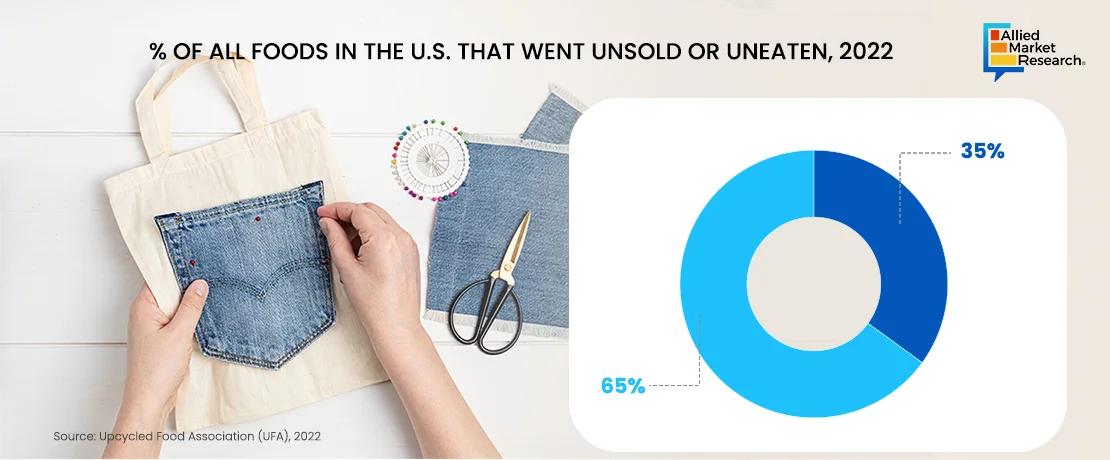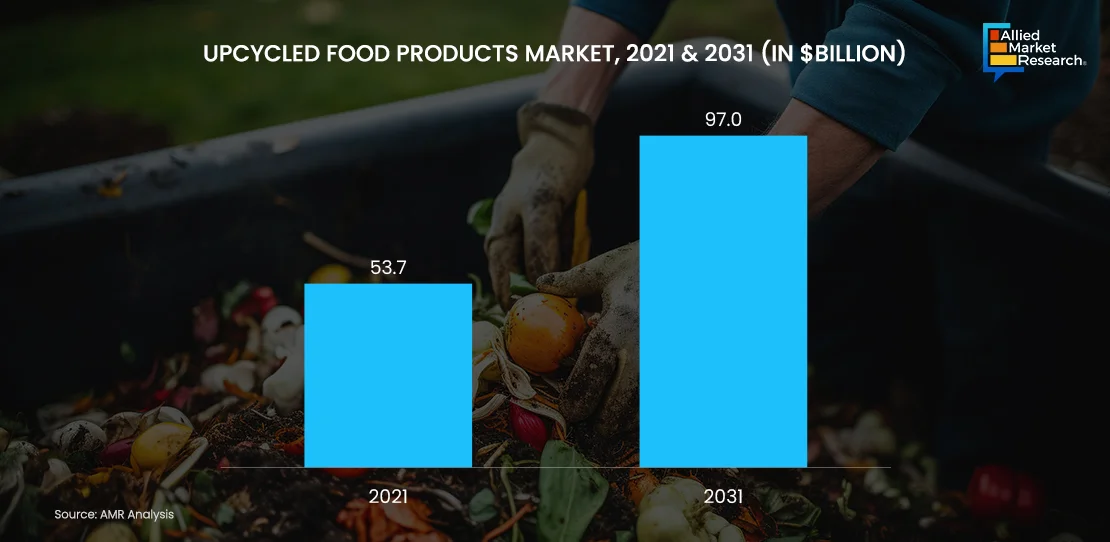Revolutionizing Food Industry: Innovations in Upcycled Ingredients

Upcycled ingredients, as defined by the Upcycled Food Association (UFA) and The Natural Resources Defense Council (NRDC), refer to materials that are leftovers from food production, cannot be eaten directly, and are obtained through market supply chains. Using upcycled ingredients in food and drink is a new and smart way to make sustainable products while cutting down on global food waste. The upcycling of ingredients provides more feasible solutions to the global food manufacturers by using byproducts of food and food surplus materials that leads to wastage. These ingredients include a variety of products like fruit and vegetable pulp from juicing, coffee grounds, and leftover grains from brewing beer. The transformation of these surplus food materials into consumables such as protein powders, flour, and flavors support the prevention of food wastage worldwide. Food manufacturers are turning food waste into profitable ingredients, addressing the growing issue of food wastage.

Rising Interest of Food Manufacturers in Upcycling
The food manufacturers are intensively focusing on cost reduction by adopting upcycled food ingredients in their food manufacturing process. The upcycled ingredients market is majorly driven by the rising interest of manufacturers in the manufacturing of upcycled food products. The upcycled food products industry size is projected to be fueled by the rising cost of raw materials which is forcing businesses to look out for alternate, more affordable sources of food ingredients.
The manufacturers can cut expenses by reusing excess or waste materials that would otherwise go to waste by upcycling food waste. This helps businesses increase their bottom line and lower their overall cost of production, while also lessening their environmental effect and promoting a more sustainable food system. Government efforts and spending on waste collection, separation, and upcycling technology for food have grown. This has boosted the emergence of small and medium-sized upcycling firms in various countries, both established and new. Construction of a food waste management facility in these places is anticipated to reduce product dumping in landfills and increase upcycling. Construction of a food waste management facility in these places is anticipated to reduce product dumping in landfills and increase upcycling and is expected to propel upcycled ingredients market.
Adoption of Innovative Ways to Reuse Food
The global upcycled food products industry size was valued at $53.7 billion in 2021, and is projected to reach $97 billion by 2031, growing at a CAGR of 6.2% from 2022 to 2031. Food companies are actively seeking innovative methods to upcycle food to address the rising issues of food waste, environmental sustainability, and financial improvement. Small local businesses along with overseas organizations are emphasizing the importance of reducing food wastage and looking for creative techniques to utilize uneaten food materials. Upcycled ingredients often come from food waste, with agricultural byproducts and brewery waste playing a big role in the sector. The Upcycled Food Association drives a growing community with more than 260+ upcycled food companies and leaders in approx. 20+ countries worldwide. The sign of rising engagement of the manufacturers in this food ingredient revolution impacts the trends and awareness among consumers to adopt upcycled food products. According to the report published by Upcycle Food Association, 2022, sales of Upcycled Certified products have rose significantly with 1,046% during the year 2021 and 2022. Thus, the demand for upcycled food ingredients is propelling among the food manufacturers who are catering to the innovative demand for upcycled food products from consumers.

Technologies Used in Enhancement of Upcycled Ingredients Production
Investors across the world and large food companies have seen upcycling in the circular economy which is setting up as an attractive business opportunity to get profits while contributing to global issues including sustainability and food waste. For instance, Nestle SA is focusing on the reuse of their coffee beans, cocoa pulp, and other byproducts obtained from its manufacturing process to produce innovative upcycled food products such as beverages, confectionery, and others.
Several technologies are engaged in the innovation of upcycled ingredients and manufacturers are focusing on their efficient execution to enhance productivity. Below are the most prominent technologies serving a specific purpose in revolutionizing food byproducts materials into consumables:
- Drying and milling
- Extraction and purification
- Fermentation
- Enzymatic treatment
- Freeze-drying
Consumers are Increasingly Seeking for Food Products with Upcycled Ingredients
Although, the upcycled ingredients is a small and niche market, the consumers are inclining towards the food products with upcycled ingredients due to the beneficial innovation and environmental contributions. According to the survey conducted by Food and Nutrition Science, 2022, 80% of surveyed participants would start preferring and consuming foods with upcycled ingredients because of their environmental benefits. Consumers are becoming more aware of the environmental impact of food waste and are actively looking out for sustainable food products. Upcycled ingredients provide solutions to food waste by reusing waste materials, catering to the consumers' need to minimize their negative environmental impact.
Companies like Pulp Pantry, Renewal Mill, Climate Candy, Upcycled Foods, Rind, and Barnana are gaining popularity for their sustainable approach to creating food products from surplus food, edible waste, and byproducts. These startups, focused on upcycling, offer a range of items from climate-friendly baking mixes to plant-based candy, addressing the significant issue of food waste. Nearly 40% of annual food production in the US, valued at $473 billion, goes unsold or uneaten. The upcycled food trend is crucial in addressing this issue, as it contributes to a substantial climate footprint equivalent to the entire US aviation industry.
As a market research leader, Allied Market Research is committed to facilitating a comprehensive understanding of the innovative landscape involving upcycled ingredients. As we engage with vendors, we aim to empower them with the necessary knowledge to make the best of this practice within their businesses. We provide valuable insights on how vendors can strategically integrate upcycled ingredients, offering guidance on optimal utilization and highlighting the advantages associated with embracing this sustainable approach. We intend to promote both environmental sustainability and improved business opportunities for our valued clients and partners. Join us on a journey of innovation, sustainability, and growth as we work together to make a positive impact. To gain deeper insights into the food & beverages industry, contact our esteemed professionals.



